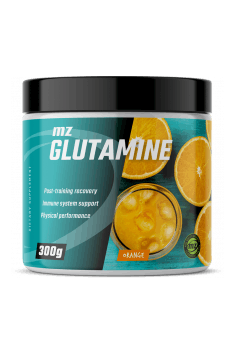Glutamine is one of the so-called conditionally essential amino acids. Its supplementation is recommended during intensive workout load because its loss from muscles can be too high during this time, which will result in a negative effect on the functioning of the body. Glutamine supplementation accelerates regeneration and has an anti-catabolic effect.
Glutamine effects
Glutamine is the amino acid with the highest concentration in the human body because it constitutes over 60% of all free amino acids in muscles. Its presence in the body is necessary for many physiological reactions. It is needed by the brain, the immune system, the digestive tract, and muscles. The brain and the immune system use glutamine firstly.

Therefore, if heavy training is involved, glutamine stores may be too low and muscles may run out of it. To prevent this from happening, it's worth reaching for a supplement. The right amount of glutamine also affects the condition of the intestines, which translates into better absorption of nutrients.
The glutamine found in supplement form is L-glutamine. It increases glycogen production in the liver and is needed to convert ammonia into urea. In addition, it is necessary for the production of the powerful antioxidant, glutathione, a compound that plays a key role in maintaining the body's homeostasis. Glutathione during the workout improves the body's performance and endurance, so an adequate amount of glutamine as a component of glutathione is important.
Glutamine dosage
Determining the optimal dosage is not easy, as there is a lot of discrepancy in the research. However, you should certainly not exceed 40g per day. Larger doses can cause side effects, including even kidney damage. It is important to remember that glutamine levels rise quickly, but also fall so. In order to regularly raise the level of glutamine in plasma and muscles, it is best to use small doses, i.e. about 4-5g, 2-3 times a day, in 90-120 minute intervals.






